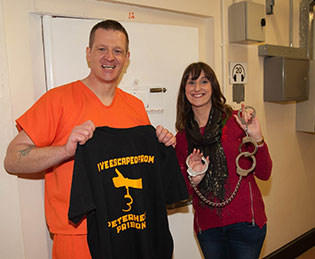Blog, Vows and Venues Bridal Magazine, North West Bridal Magazine, North East Bridal Magazine, Yorkshire Bridal Magazine, Midlands Bridal Magazine

Jacqueline A (Bennett) Hollows MSc is the founder of Beyond Recovery CIC – an organisation working in the CJS with an innovative Freedom of Mind programme which has been evidenced and had a profound impact over the last five years. Here, she tells the story of what happened in one of her groups when a previous graduate died of a drug overdose…
Mind Beyond Bars #01-19– Charlie’s story
You get to hear and all sorts of things when running groups for inmates in prison. All of humanity turns up in these rooms. Gritty stories of hardship and wrongdoing, traumatic stories of lives damaged, stories of hope and change, and stories of pain and suffering.

Mark Bedding, Customer Relationship Manager at Chorus Intelligence, discusses the technology that can improve the digital disclosure process…
Disclosure is out in the open. It’s part of the national conversation following the collapse of a series of rape trial cases at the end of 2017 and start of 2018, when text and social media exchanges emerged that undermined the complainants’ accounts.
As the CPS recognises, disclosure weaknesses have become the prosecutors Achilles heel. But, for the vast majority of forces the technology that could make a difference to the quality and speed of disclosure is already in the intelligence room, and being used by their analyst colleagues.

The pressures on our custodial system are well documented. The government has pledged funding to address the problem but what can be done now to improve officer and inmate safety?
At the end of last year HMP Birmingham saw what was dubbed the ‘worst prison riot since Strangeways’. Four wings at the privately-run Category B prison were overrun by inmates, riot squads were deployed while prison inmates posted ‘selfies’ of themselves wearing prison officers’ uniforms and showing off sets of keys.

Article by: Sophie Walker, crime and prison law barrister at One Pump Court
My work in the criminal justice system stretches from cradle to grave: I work with pregnant women and new mothers facing custodial sentences, young defendants in youth offender institutions and older prisoners who have spent decades inside. I also represent bereaved families at inquests whose loved ones have died in prison or while on probation, as a result of mental health issues. If there is one thing that unites these people, it is that they entered the criminal justice system in poor mental health, and left it worse.
I was recently instructed in an inquest on behalf of a family whose loved one died on the day of his release. A report from his treating psychiatrist in prison outlined his reasons for prescribing him a strong anti-psychotic drug during his prison sentence. They explained that it is common for prisoners to start experiencing psychosis despite not having any underlying mental health disorders like schizophrenia. In other words, the experience of incarceration can seriously impact a prisoner’s mental health.

While prisons exist to help rehabilitate people who have committed a crime or hold those awaiting trial, prisoners still have basic rights to a clean and hygienic habitation. Regular cleaning of prison areas is an important task, especially when you consider how many people live and work within prison environments. The UK’s current prison population is approximately 83,000, with around 35,000 employees keeping these facilities running as smoothly as possible.
While frequent cleaning forms part of the day-to-day management of these buildings, specialist deep cleaning is also required to prevent the spread of disease and ensure the area is fully disinfected for both inmates and staff.
Deep cleaning
The build-up of general grime and obvious dirt may be removed as part of a regular cleaning regime, but beneath the surface, unseen deposits and microscopic bacteria and pathogens can accumulate.
This is where employing industrial cleaning experts can complement daily cleaning routines, as they will have access to resources such as clinical grade disinfectants, high level cleaning equipment and specialist fogging as part of their armoury. ULV Fogging, for example, works by generating a mist of disinfectant, which settles on top of, underneath and on the sides of objects, furniture and hard-to-reach areas - ideal for ensuring every surface is covered.
How a data-driven approach to cross-boundary policing will help the police tackle county lines crime

Richard Helson, customer relationship director at Chorus Intelligence, tells Custodial Review about the need to change tack which it comes to tackling county lines crime…
A recent report by the Public Accounts Select Committee concluded that the police are taking longer to charge suspects, with fewer arrests and reduced numbers of patrol officers. On top of this, we are fighting against growth in the use of technology, by criminals.

Andy Robertson, an escape artist whose specialty is escaping from locked prison cells, offers an insight into getting out of "impossible" situations…
Prison escapes in the UK are rare – but then how have so many prisoners over the years escaped out of seemingly high-security prisons all from the UK and other parts of the world? That’s the question that intrigued me, I had to know how they were getting out and whether it was by flaws in security, or skill, or just plain luck!
Over many years I studied locks and doors used as well as the old and modern type prison and jail buildings. I spoke to many people from prison historians to those who were presently in the profession linked to prison security. I also learned the skills and knowledge as an escape artist over many years from fellow escape artists, finally in 2017 I had the ability to escape any prison and I was soon to be challenged to prove it.

Brain injury charity Headway support people in the community following head traumas. Here, we speak to Headway’s James Coxon about the charity’s ID cards which can help aid communication between the brain injury survivor and police officers…
Headway – the brain injury association supports people affected by acquired brain injury through a wide range of services, including rehabilitation programmes, carer support, social re-integration, community outreach and respite care.

Tim Tate is an author, investigative journalist and filmmaker who worker with the late Ray Wyre – a pioneer in treatment of child sex offenders. Here, Tim describes how Ray’s work challenged the lack of rehabilitation options for paedophiles and asks if the current system is doing enough to protect children from abuse…
For someone whose work would become so influential, Ray Wyre’s introduction to sex offenders was surprisingly accidental.
In 1981, three years after joining the Probation Service, he was transferred to Albany, the high security facility on the Isle of Wight: here, by chance, he was assigned to the E Wing, which then housed 36 sex offenders in segregation from the rest of the prison’s population.

Despite financial cut-backs, the creative side of prison life always seems to win through. Events such as the annual Koestler Awards are evidence of this. So is the sterling work of, for example, Birmingham’s Geese Theatre, whose The Geese Theatre Handbook: Drama with Offenders and People at Risk has been a staple manual for trainers of all kinds since we had the privilege of working on it with them at the start of the millennium.
A similarly prized work is Michael Crowley’s Behind the Lines: Creative Writing with Offenders and People at Risk published in 2012. It shows how imaginative approaches to confronting offending behaviour – and imparting skills valuable on the outside – can have a real impact on whether someone returns to custody. Michael is a seasoned advocate for improving literacy in the prison setting. Quite apart from giving presentations at establishments such as Bristol and Erlestoke, he was for six years writer in residence at Lancaster Farms (then a young offender institution). He also helped set up a residency at Arohata Women's Prison in New Zealand in 2014.
